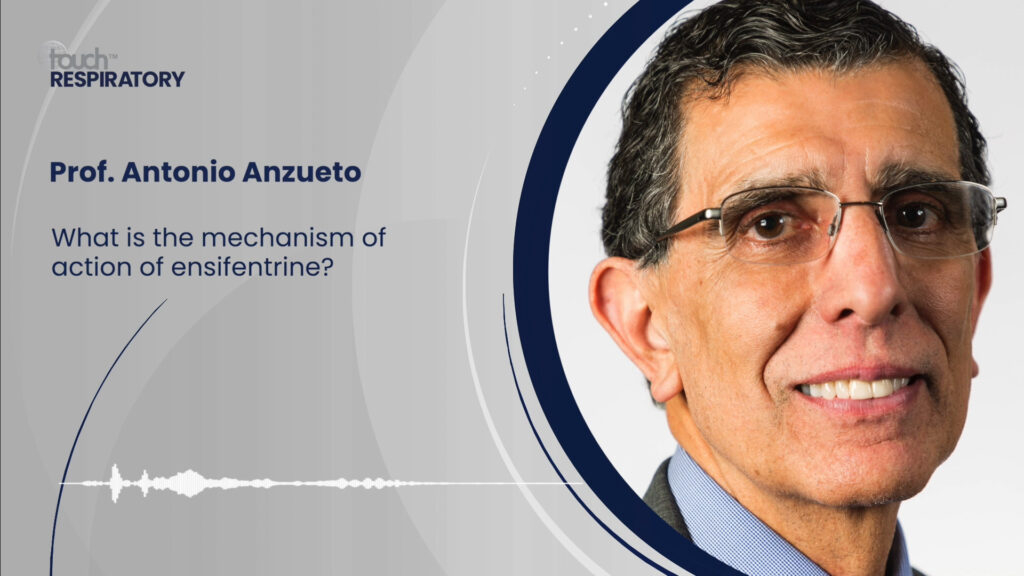Dupilumab is an investigational monoclonal antibody that mitigates type 2 inflammation by blocking IL-4 and IL-13 receptors in patients with COPD. We were delighted to talk with Prof. Klaus F. Rabe (University of Kiel, Germany) around the unmet needs in the treatment of COPD, the association between type 2 inflammation and COPD exacerbations and the rationale for investigating dupilumab in this indication.
The abstract ‘Efficacy and Safety of Dupilumab in Chronic Obstructive Pulmonary Disease With Type 2 Inflammation.‘ was presented at ATS 2023, 19-24 May 2023.
Questions
- What are the unmet needs in the treatment paradigm for chronic obstructive pulmonary disease (COPD)? (0:38)
- What is the association between type 2 inflammation and repeated exacerbations in COPD? (1:44)
- What is the mechanism of action of dupilumab and how will this mitigate type 2 inflammation? (3:40)
Disclosures: Klaus Rabe discloses consulting for, receiving grant/ research support from, serving on advisory boards for and receiving honoraria from AstraZeneca, Boehringer Ingelheim, Chiesi Pharmaceutical, Sanofi and Regeneron; and participating in speaker’s bureaus with AstraZeneca, Boehringer Ingelheim, Berlin Chemie, Chiesi Pharmaceutical, Sanofi and Regeneron.
Support: Interview and filming supported by Touch Medical Media Ltd. Interview conducted by Victoria Jones.
Filmed in coverage of the ATS Annual Meeting.
Click here for more content on COPD.
Transcript
What are the unmed needs in the treatment paradigm for chronic obstructive pulmonary disease (COPD)? (00:37)
COPD is first of all, a very prevalent disease. And the WHO, some years ago, still said, this is not curable, you can improve symptoms, you can improve some outcomes, mortality is a real issue. So is there a problem in treatment? Yes, there is. We can help some patients symptomatically. There still is a high burden of disease in people dying from it, and it is also a spectrum of diseases in the spectrum that we call multi-morbidity, where COPD, next to cardiovascular disease, next to metabolic disease, plays the major role. Secondly, there is this area of exacerbations, flare-ups of the disease with the acute care emergencies, with the acute care in hospitals, partly on ventilators that creates enormous burden to the patients, it creates an enormous burden economically, and it creates an enormous burden to healthcare systems worldwide.
What is the association between type 2 inflammation and repeated exacerbations in COPD? (01:45)
Type 2 inflammation has been mentally reserved, actually for asthmatic inflammation. That is in the mind of a lot of individuals. It has been adopted by GINA documents, in terms of a spectrum of the disease characterized by certain inflammatory parameters, for example, increased blood eosinophils, increased NO levels in the exhaled breath, partly with elevated IgE levels as a biomarker. And we’ve learned from that, that this is a spectrum of diseases, which is amenable to change from certain medications to novel medications. What we learned later is that there is a proportion of individuals with COPD, not the majority, but a proportion, something between 20% and 40%, dependent on the database and the epidemiological data, where this type 2 inflammation is relevant at present in COPD patients as well and in these patients with high eosinophilia, we knew already, before the concept of type 2, that it is these eosinophils that present an indicator of instability. With other words, patients that have high eosinophil levels, statistically, epidemiologically have more exacerbations than those people that don’t have this. Finally, and thirdly, we’ve learned from classical therapy that it is those individuals that probably benefit most from inhaled corticosteroids, and this is why documents and guidelines propose to look at this biomarker to make a decision whether you treat someone with a bronchodilator alone, or whether you add an inhaled corticosteroid to it at a double or now preferably the so-called triple therapy.
What is the mechanism of action of dupilumab and how will this mitigate type 2 inflammation? (03:41)
Dupilumab is a monoclonal antibody that is directed against the receptor of IL-4 and through the molecular structure of the receptor, it inhibits, in fact, the action of IL-4 and IL-13. This has been proven to be highly efficacious in forms of asthma with type 2 inflammation, but also in other indications such as atopic dermatitis, chronic rhinosinusitis with polyps, eosinophilic esophagitis. So it is a type of inflammation where this is working and underlying the fact that it is to IL-4 and IL-13, the cytokines acting in synergy and together that would mitigate a lot of these effects that occur in different levels of the body for obstructive lung disease, primarily in asthma in the past before the trial that we will be discussing later, it was quite clear that individuals with more severe disease, type 2 inflammation, with exacerbations that there those cytokines play a major role in mucus hypersecretion, impairment of lung function, and the mechanisms underlying exacerbations. That was known before we conducted the trial in COPD.
Subtitles and transcript are autogenerated











